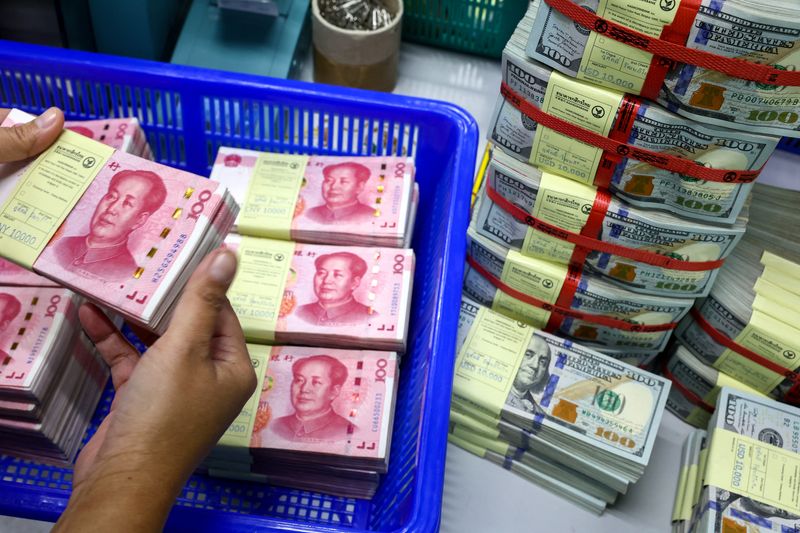By Navya Mittal
(Reuters) - Bearish tones persisted for most Asian currencies as a bleak post-pandemic recovery in China weighed on risk sentiment, a Reuters poll showed on Thursday, but softer U.S. inflation data could prompt a scale-back on short bets, analysts said.
Short bets on the Taiwan dollar rose to its highest since November, while bearish bets on the yuan and the Malaysian ringgit eased slightly, according to a fortnightly poll of 12 analysts.
However, all 12 responses came in before the surprisingly low U.S. June inflation print, which fanned speculation of an end to rate hikes.
"Following a weaker-than-expected U.S. inflation and the selloff in the U.S. dollar, I do expect a lot of the short positions against Asian currencies to unwind," said Khoon Goh, head of Asia research at ANZ.
The yuan, the Taiwan dollar and the Korean won could all see a reduction in short positions, Goh added.
A slew of gloomy economic data from China, Southeast Asia's top trading partner, has raised investor concerns about deflation risks, fuelling bearishness against the region's currencies, with the ringgit emerging as the most shorted among its peers.
"The falling momentum in MYR has similarly attracted more bearish positioning," said Alvin Tan, head of Asia FX strategy at RBC Capital Markets.
Analysts at Maybank in a note said they will look for any cues on further stimulus from the world's second-largest economy, which could help support Asian currencies, especially the ringgit.
The Malaysian ringgit has depreciated more than 4% so far this year, making it the worst performer among the Asian emerging markets peers.
Persistent capital outflows in Malaysia's export-focussed economy further dampened sentiment, with the central bank citing recent movements in the currency as 'excessive' and saying it will intervene in the foreign exchange market to stabilise it.
The Asian currency positioning poll is focused on what analysts and fund managers believe are the current market positions in nine Asian emerging market currencies: the Chinese yuan, the South Korean won, the Singapore dollar, the Indonesian rupiah, the Taiwan dollar, the Indian rupee, the Philippine peso, the Malaysian ringgit and the Thai baht.
The poll uses estimates of net long or short positions on a scale of minus 3 to plus 3. A score of plus 3 indicates the market is significantly long on U.S. dollars.
The figures include positions held through non-deliverable forwards (NDFs).
The survey findings are provided below (positions in U.S. dollar versus each currency):
DATE USD/CNY USD/KRW USD/SGD USD/IDR USD/TWD USD/INR USD/MYR USD/PHP USD/THB
13-Jul-23 1.33 0.12 0.62 0.52 1.13 0.1 1.77 0.26 0.73
29-Jun-23 1.74 0.29 0.5 0.3 0.72 -0.14 1.85 0.29 1.03
15-Jun-23 1.59 -0.03 0.17 -0.33 0.68 -0.24 1.64 0.74 0.25
01-Jun-23 1.88 0.68 0.73 0.23 0.7 0.48 1.77 1.08 0.45
18-May-23 1.27 0.88 0.19 -0.27 1 0.11 1.1 1.12 -0.5
04-May-23 0.56 1.01 -0.04 -1.05 0.65 -0.14 0.69 0.86 -0.43
20-Apr-23 -0.14 0.36 -0.13 -0.47 0.3 0.3 0.54 0.95 -0.12
06-Apr-23 0.04 0.56 -0.39 -0.26 -0.03 0.3 0.29 0.08 -0.06

23-Mar-23 0.17 0.87 0.16 0.74 0.63 0.58 0.74 0.36 0.37
09-Mar-23 0.68 1.3 0.65 0.56 0.78 0.28 0.78 0.42 0.3